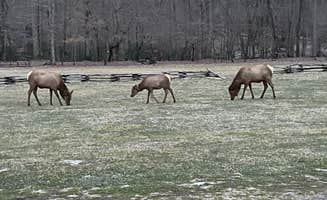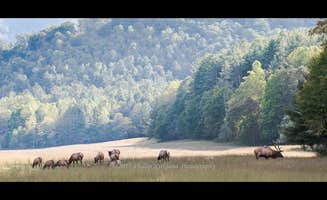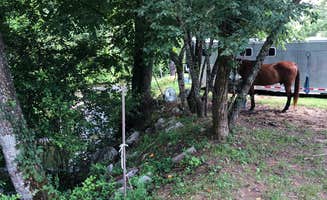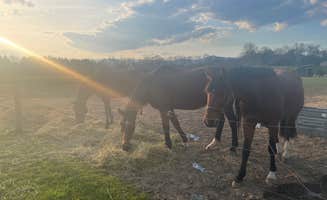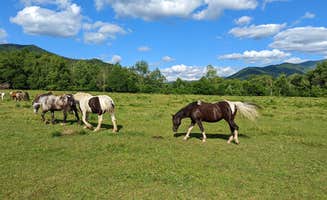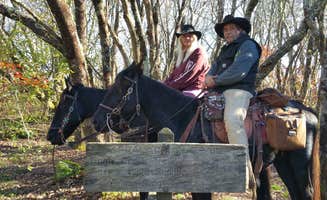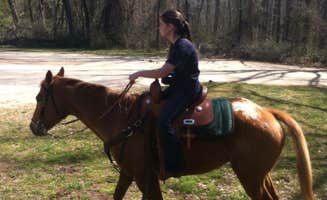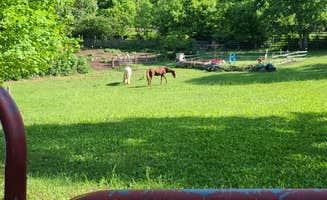Camping options near Sylva, North Carolina include established campgrounds within the Pisgah and Nantahala National Forests, with dispersed camping available in designated areas. The region sits at elevations between 2,000-5,000 feet, contributing to cooler temperatures even in summer months. Rainfall averages 50-60 inches annually, creating lush forests and numerous waterways throughout the camping areas.
What to do
Waterfall hiking: 3 miles from Deep Creek Campground. The nearby Great Smoky Mountains National Park entrance offers multiple waterfall hikes within walking distance. "The falls were beautiful, and jumping into Midnight Hole was fun. Even at midnight," says one visitor to Big Creek Campground. Trails range from easy 0.2-mile walks to more challenging 3-5 mile loops.
Trout fishing: Access points throughout Mills River area. North Carolina fishing licenses required, with designated catch-and-release sections. "The headwaters of the Nantaha River flow through the campground providing a gathering place for families to enjoy playing in a cold mountain stream," notes a reviewer at Standing Indian Campground.
Mountain biking: Daily trail rotations at Tsali. The trail system offers four main loops alternating between biking and horseback riding days. "This is the campground to stay if you want to mountain bike. The Tsali system starts right from the campground. You can ride to & from your campsite and never have to load up," writes a Tsali visitor.
What campers like
Quiet, secluded settings away from crowds. While some areas near Sylva can get busy during peak seasons, many campers appreciate the peaceful environment. "The campground is very small with only 12 campsites. Each one has a firepit, picnic table, lantern pole, and a very large tent pad," explains a Big Creek camper. "The camp is beautiful and you are surrounded by the magical sounds of rushing water."
Clean facilities with basic amenities. Most campgrounds maintain well-kept restrooms and common areas. "Bathrooms were clean and accessible. I like the area the campground is located in," says one camper about Cataloochee Campground. Though not all campgrounds offer showers, many have flush toilets and potable water.
Wildlife viewing opportunities. The region is home to diverse wildlife including elk and black bears. "We spent 5 nights and watched them early am and afternoons every day. They will get up close-and personal. The rangers keep a watch out, tho, and try to warn u if they are coming too close," notes a Cataloochee visitor about the elk.
What you should know
Bear activity requires proper food storage. Black bears are active throughout the region, especially in Panthertown Valley. "It is imperative to purchase a decent map for these trails and I highly recommend using the one available via the Friends of Panthertown website. You will really need to pack a bear safe food container and absolutely store food using a bear line well away from camp," warns a visitor to Panthertown Valley Backcountry Area.
Narrow access roads to remote campgrounds. Some campgrounds have difficult approach roads not suitable for large vehicles. "The road to this campground is very narrow, the hill is very steep, and there is at least one very tight hairpin turn. Unless there is another way into this lovely park that I am unaware of, I would not attempt to tow a 5th wheel or other large trailer to this location," cautions a Standing Indian visitor.
Limited or no cell service. Most campgrounds in the area have minimal to no connectivity. "If you need to get ahold of someone though you'll have to drive 10 to 15 minutes into town," notes an Oconee State Park camper.
Tips for camping with families
Select campgrounds with kid-friendly amenities. Some campgrounds offer designated play areas or shallow creek access. "This was a great family campground. Plenty for the kids to do, including gem mining, feeding goats and several playgrounds. Plus you can rent tubes and drive a short distance into the national park for some fun tubing," recommends a visitor to Deep Creek Tube Center & Campground.
Consider campgrounds with educational opportunities. Historical structures and ranger programs provide learning experiences. "There are historical homesteads, a school, churches and cemetery to take you back in time. Trails by creeks there to hike," shares a Cataloochee camper.
Plan for variable weather conditions. Mountain weather changes quickly, with afternoon thunderstorms common in summer. "We camped here in November and didn't have a problem getting a site, but the place did fill up! Go on the car tour loop and make sure to stop and look at the cabins and church. History at its finest," notes a visitor to Cades Cove Campground.
Tips for RVers
Verify site sizes before booking. Many campgrounds in the area have limited space for larger rigs. "Though many campsites will accommodate large rigs, motorhomes over 32' and trailers over 25' in length are not recommended due to the access road," cautions a Cataloochee visitor about the narrow, winding approach.
Reserve early for equestrian camping near Sylva. While dedicated horse campgrounds near Sylva are limited, some areas accommodate horses with advance arrangements. Horse owners should contact campgrounds directly to confirm current policies and availability for equestrian camping facilities.
Bring leveling blocks. Many sites in mountain campgrounds are not perfectly level. "Even the not so prime sites are still wonderful because of this campground. Just keep checking Recreation.gov to see what comes available," suggests a Cataloochee camper about finding suitable spaces.


